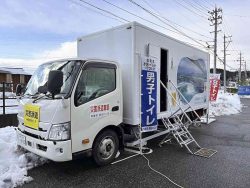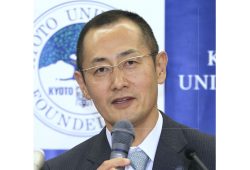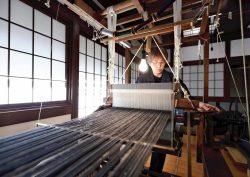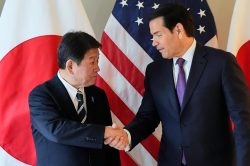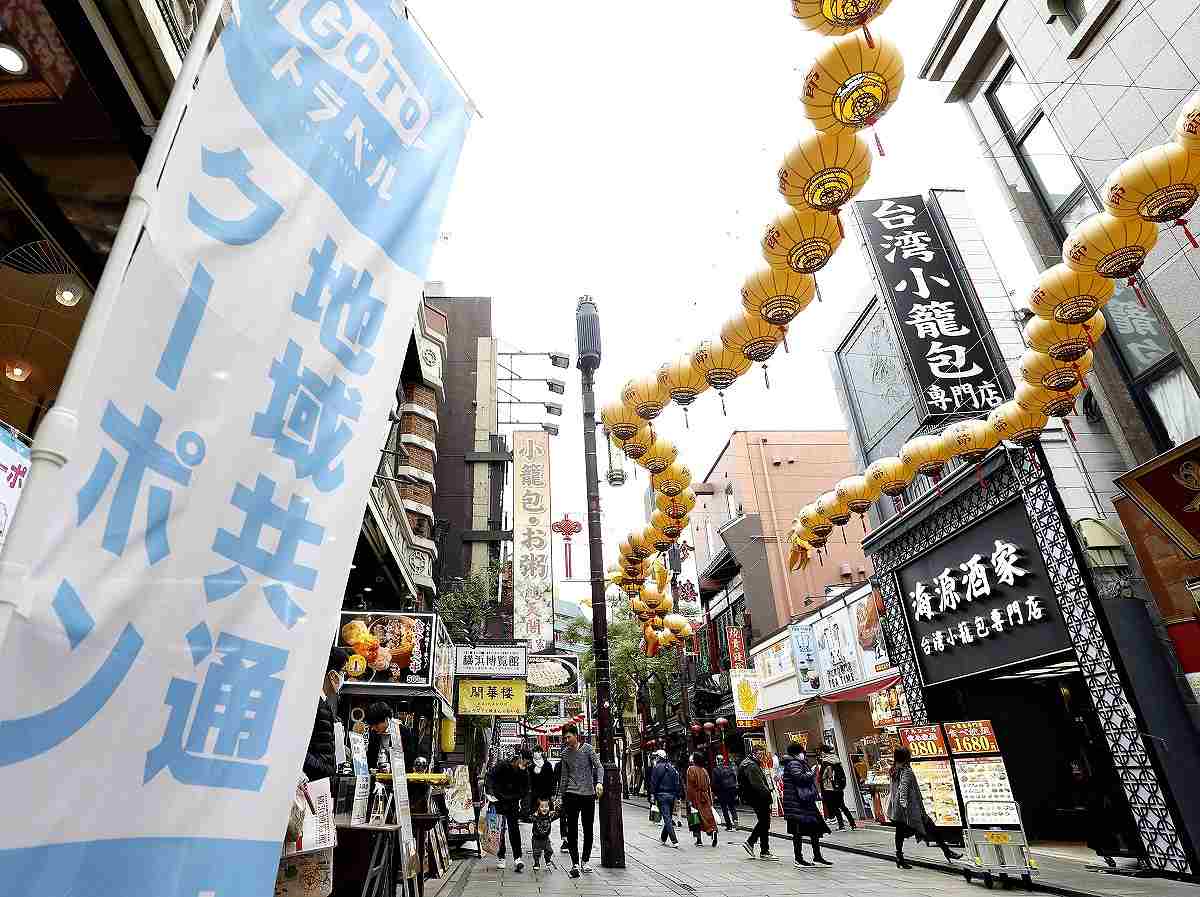
The Yokohama Chinatown district in Naka Ward, Yokohama, is less crowded than usual on Monday partly due to the suspension of the Go To Travel campaign.
16:12 JST, December 29, 2020
The government’s sudden policy change, to suspend the “Go To Travel” tourism promotion campaign nationwide, has thrown tourism businesses into confusion during the busy year-end and New Year holiday period.
While the campaign is scheduled to be suspended from Dec. 28 to Jan. 11, the suspension is likely to be extended, depending on the situation of novel coronavirus infections. The tourism industry could face a more depressing situation going forward.
■ Room rates slashed
Yokohama’s Chinatown district is a major sightseeing spot. Usually, its sidewalks are so crowded at this time of year that people are constantly dodging each other. But this year, the streets were uncrowded even around noon on Monday. “While our sales had recovered thanks to the Go To Travel campaign, the year-end and New Year period is going to be tough for us,” a souvenir shop manager lamented.
Accommodation facilities are busy responding to customers. Around the Dogo hot spring resort in Ehime Prefecture, most ryokan inns and hotels had been fully booked for the holiday season, but reservations for a total of 26,524 nights had been canceled as of Dec. 24. The figure is equivalent to 3.5% of the annual number of overnight stays in the hot spring resort. If guests are scarce, accommodation facilities will incur losses even if they continue to operate. So some hotels and ryokan inns decided to close, letting their guests stay at different accommodation facilities, while others are asking their regular employees to take a leave from work.
In Kyoto, hotels usually raise their rates during this period. However, a hotel in the Apa Hotel chain at one point offered a room for less than ¥2,000 per person per night, not including tax. One hotel after another has offered rooms for ¥1,000 to ¥1,999, leading to a collapse of prices.
■ Dissatisfied with compensation
Negative effects of the suspension of the Go To Travel campaign will cause losses of about ¥500 billion each month, according to an estimate by Yutaro Suzuki, economist at the Daiwa Institute of Research Ltd. Considering the impact on the tourism industry, the government raised the upper limit of compensation for businesses receiving cancellations, from 35% of travel expenses to 50% percent, capped at ¥20,000 per person, but only during the nationwide suspension of the campaign. For package tours, the government created a system to allocate compensation to tourism and transportation facilities in addition to hotels.
However, even though monetary compensation is provided, it may not be enough for businesses to cover employees’ salaries and the costs of supplies already ordered. There is a strong dissatisfaction among those in the tourism industry who think the compensation amount is too small.
Furthermore, online travel booking companies are not eligible for compensation as the government says that they will not suffer actual damage from cancellations. However, AirTrip Corp., a Tokyo-based company operating a travel booking website, said that it recently had to outsource part of its customer service operations to an external call center as more than 80% of its customers were cancelling their bookings. “Without compensation, we are in a difficult situation,” a company spokesperson said.
Businesses providing supplies and services for accommodation facilities are also not eligible for compensation. The president of a linen supplier doing business with about 600 ryokan inns and hotels in Nagano Prefecture says that the company would suffer a loss of more than ¥10 million during the year-end and New Year holiday period alone. The government is asking hotel operators to distribute part of the compensation they receive to their contractors so that they will be able to receive funds. However, it is unclear whether the request is actually being implemented as all businesses are having a hard time.
■ Foreign tourist numbers plunge
With the government having introduced a ban on new entries of foreign nationals from all countries and territories until the end of January in principle, it is more difficult to expect a recovery in foreign visitors to Japan, which is positioned by the government as a pillar of its growth strategy.
In 2016, the government set targets of 40 million visitors to Japan by 2020 and 60 million by 2030. To achieve these targets, the government eased visa requirements and expanded the tax exemption system for foreign tourists. In 2019, a total of 31.88 million tourists visited Japan, bringing great benefits to the overall Japanese economy.
However, the spread of the novel coronavirus turned things around. The number of foreign visitors to Japan was down by about 99% from a year earlier for six consecutive months, from April to September. In 2020, the total number of foreign visitors is expected to stand at over 4 million people.
Even so, the government partially eased travel restrictions for businesspeople in October, and November saw a slight improvement in the decline of foreign visitors — although still down by 97.7% from a year earlier.
The government had only recently started to prepare for holding small group tours for foreign tourists on a trial basis while avoiding crowds.
Top Articles in Society
-

Man Infected with Measles May Have Come in Contact with Many People in Tokyo, Went to Store, Restaurant Around When Symptoms Emerged
-

Woman with Measles Visited Hospital in Tokyo Multiple Times Before Being Diagnosed with Disease
-

Australian Woman Dies After Mishap on Ski Lift in Nagano Prefecture
-

Foreign Snowboarder in Serious Condition After Hanging in Midair from Chairlift in Nagano Prefecture
-

Record-Breaking Snow Cripples Public Transport in Hokkaido; 7,000 People Stay Overnight at New Chitose Airport
JN ACCESS RANKING
-

Japan Institute to Use Domestic Commercial Optical Lattice Clock to Set Japan Standard Time
-

Israeli Ambassador to Japan Speaks about Japan’s Role in the Reconstruction of Gaza
-

Man Infected with Measles May Have Come in Contact with Many People in Tokyo, Went to Store, Restaurant Around When Symptoms Emerged
-

China Eyes Rare Earth Foothold in Malaysia to Maintain Dominance, Counter Japan, U.S.
-

Prudential Life Insurance Plans to Fully Compensate for Damages Caused by Fraudulent Actions Without Waiting for Third-Party Committee Review


